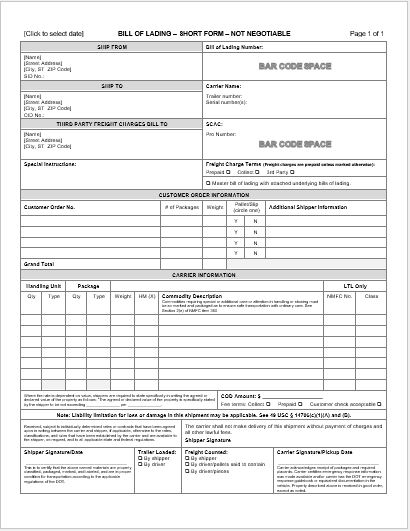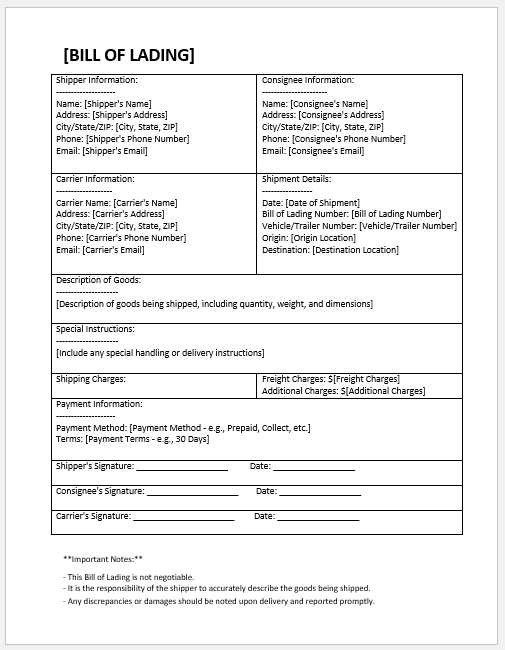A bill of lading is a legal document that acts as a contract for the transportation of products between a shipper and a carrier. Its legality is upheld by the fact that it is used by authorities all around the world to ensure trade agreements.
It specifies the shipment conditions as well as the responsibilities of each party involved in the transportation process. This article will provide a template for a bill of lading, explore its use and significance, and conclude with its significance in the shipping business.
Template
- Shipper’s Name and Address: Information about the person who ships the goods.
- Consignee’s Name and Address: Information about the person to whom the goods will be delivered.
- Carrier’s Name and Address: Information about the mode of transport and the company that undertakes the transportation.
- Date of Shipment and Delivery: The dates when the goods were shipped and meant to be delivered
- Description of Goods: Information regarding items included in the goods, their value, and quantity
- Payment Amount and Methods: The amount paid, and the payment method used.
- Terms & Conditions: The specified terms and any sort of liabilities.
- Signature: This includes the signatures of all the parties involved.
Uses
A bill of lading is commonly employed in foreign trade to facilitate the transfer of goods between parties. These parties trade with each other after approvals from their respective authorities. A bill of lading document acts as a carriage contract between a shipper and a carrier, outlining the terms and conditions of transportation. Authorities use this bill to ensure compliance and maintain trade policies.
A bill of lading is also useful for providing a detailed description of the products being shipped. This information includes things like the quantity, weight, and packaging of the products. This information is critical for the shipper and the consignee (the person getting the goods) to ensure that the correct items are transported in good condition.
It serves as a legal document
A bill of lading is a legal document that establishes a contract between a shipper and a carrier in international commerce. It acts as a book of rules for a particular transportation. As heavy goods and millions of dollars of investment are involved in transportation, the bill of lading provides a comprehensive description of the goods being shipped, including quantity, weight, and packaging, as well as the terms and conditions of transportation.
The value of a bill of lading stems from its ability to serve as a receipt for products, a title document, and a contract of carriage all in one. As a receipt of goods, it confirms that the goods mentioned in the document have been received by the carrier.
It acts as proof of ownership of the products being transported as a title document. And, as a carriage contract, it sets the shipment’s terms and conditions, such as the agreed-upon route, delivery timetable, and liability for any damage or loss of the goods during transit.
Overall, the bill of lading is an important document in foreign trade because it provides essential information as well as legal protection to both the shipper and the carrier involved in the movement of goods.
Conclusion
Concludingly, the bill of lading is an important tool in international trade because it provides both necessary information and legal protection to both the shipper and the carrier engaged in the movement of goods. It maintains trade policies with regular documentation.
[Word Template]

File: Word (.doc) 2007+ and iPad
Size 16 KB
Provided by: templates.office.com

File: Word (.doc) 2007+ and iPad
Size: 16 KB
See also:
- Quarterly Tax Payment Tracker
- Payroll Tracker for Excel
- Delivery Route Optimization Worksheet
- Energy Consumption Monitoring Worksheet
- Return on Investment (ROI) Calculator
- Investment Portfolio Tracker
- Equipment Utilization Worksheet
- Emissions Monitoring Worksheet
- Monthly Utility Consumption Worksheet
- Sales Tax Calculation Sheet
- Fixed Asset Register Template
- Advance Salary Tracker
- Benefits and Deductions Worksheet
- Capital Expenditure Tracker Template
- Departmental Budget Allocation Sheet